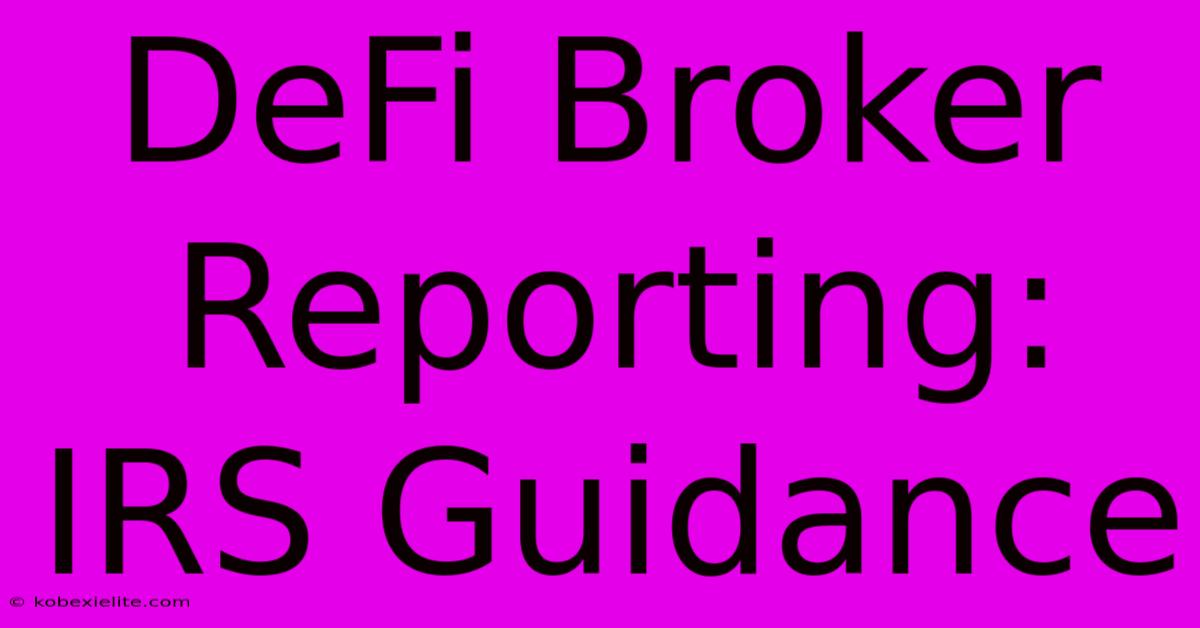DeFi Broker Reporting: IRS Guidance

Discover more detailed and exciting information on our website. Click the link below to start your adventure: Visit Best Website mr.cleine.com. Don't miss out!
Table of Contents
DeFi Broker Reporting: IRS Guidance – Navigating the New Landscape of Crypto Tax Compliance
The decentralized finance (DeFi) space has exploded in popularity, offering innovative financial services without traditional intermediaries. However, this innovation has created a regulatory grey area, particularly concerning tax reporting. The IRS is increasingly focusing on DeFi activities, and understanding the new guidance is crucial for compliance. This article clarifies the IRS's stance on DeFi broker reporting and what it means for individuals involved in DeFi activities.
Understanding the IRS's Definition of a "Broker" in the DeFi Context
The Infrastructure Investment and Jobs Act (IIJA) significantly broadened the IRS's definition of a "broker" to include individuals or entities that facilitate transactions involving digital assets. This expanded definition has significant implications for DeFi platforms and individuals using them. The IRS isn't explicitly naming specific DeFi protocols as brokers, but it's focusing on the functionality provided. If a platform facilitates the exchange of digital assets, even indirectly, it may fall under the broker reporting requirements. This includes platforms offering:
- Decentralized Exchanges (DEXs): While DEXs operate differently than centralized exchanges (CEXs), the IRS may consider certain DEXs as brokers if they provide functionalities like order matching or liquidity provision that facilitate transactions.
- Lending and Borrowing Platforms: Platforms enabling users to lend or borrow crypto assets may also be deemed brokers depending on their specific operations and the degree of facilitation they provide.
- Yield Farming Platforms: Services offering yield farming strategies might trigger broker reporting requirements if they actively facilitate transactions or manage users' assets in a manner considered brokerage activity.
Key takeaway: The IRS is not targeting the technology itself, but the actions facilitating digital asset transfers. A protocol might be considered a broker depending on the functionality it offers, regardless of its decentralized nature.
What Does DeFi Broker Reporting Mean for You?
The new regulations impact both DeFi platforms and their users. If a platform is classified as a broker, it's required to report transactions to the IRS. This means your DeFi activities, previously largely untracked, are now potentially subject to increased scrutiny. This includes information such as:
- The date of the transaction.
- The type of digital asset involved.
- The amount of digital asset transferred.
- The recipient's taxpayer identification number (TIN).
What if your DeFi platform isn't reporting? You're still responsible for accurately reporting your DeFi income and losses on your tax return. The IRS expects taxpayers to maintain meticulous records of their DeFi activities.
Maintaining Accurate Records: Best Practices
Given the complexity of DeFi, maintaining accurate records is paramount. Consider these best practices:
- Use a crypto tax tracking software: Several platforms are designed to simplify the process of tracking transactions across various DeFi protocols.
- Download transaction history regularly: Many platforms allow you to export transaction history. Regularly download and store this data securely.
- Keep detailed transaction notes: Include information beyond what the platform provides, such as the specific DeFi strategy employed or the purpose of the transaction.
- Consult a qualified tax professional: Given the complexity of the regulations, seeking professional advice is strongly recommended.
The Future of DeFi and Tax Compliance
The IRS is actively developing its understanding of the DeFi space and its implications for tax compliance. Expect further guidance and clarification in the coming years. Staying informed about regulatory updates is crucial for ensuring compliance. This includes monitoring IRS announcements, engaging with tax professionals specializing in cryptocurrency, and keeping detailed records of your DeFi transactions. Proactive compliance is the best way to avoid potential penalties.
Disclaimer: This article provides general information and is not financial or legal advice. Consult with a qualified tax professional for advice tailored to your specific circumstances.

Thank you for visiting our website wich cover about DeFi Broker Reporting: IRS Guidance. We hope the information provided has been useful to you. Feel free to contact us if you have any questions or need further assistance. See you next time and dont miss to bookmark.
Featured Posts
-
Game Recap Celtics Defeat Pacers 142 105
Dec 28, 2024
-
Driver Faces Charges After Kerr Grandma Crash
Dec 28, 2024
-
United Cup Highlights De Minaur Martin
Dec 28, 2024
-
Gerwyn Price Wins World Darts 2025
Dec 28, 2024
-
Browns 44 Points Lead Celtics Win
Dec 28, 2024
